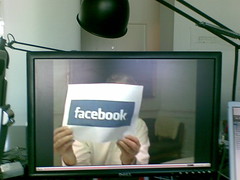
If Facebook were a verb, I would Facebook with caution.
I've used Facebook (fb) for about a year. It's a great way to keep track of far-flung former coworkers who have been leaving newspapers in droves.
Although my fb page is limited to viewing by family and friends, I find that I have collected many fb friends whom I do not know well. Some come from my current workplaces. So....I censor myself.
Before I post I ask myself: "Do I want everyone to know this about me?" I put the bare minimum of information in my profile. I tiptoe around religion and politics the same way I do in coversations at a workplace party. I only post the pictures where I look good!
In other words, I don't show my real face.
Fb and other social networking sites allow us to create social identities. That leads to this equation: fb = PR.
Here's an example: Some of my writerly friends can't resist posting links to everything they have published. Clearly, they are trying to increase their hits. Fb has turned them into their own PR agents. I realize on fb that I am getting ads from my friends instead of ads from Coca Cola or Nike.
I do enjoy the videos, the book suggestions, the photos and wry comments about happenings in my fb friends' lives. I like it when they share interesting news articles or announce big news: a baby, a new job, that sort of thing.
I really don't want any more marketing messages on my fb page. I don't typically "friend" businesses, bands or associations (OK, I did temporarily "friend" a certain U.S. President, just to see how he would use fb).
I try to do a minimum of marketing myself. I did put a WorldCat app on my fb page just to show friends how digitally hip libraries are becoming (they can search WorldCat from my page.).
Fb should be a party. Fb should be a conversation. The question we have to ask is: Will people keep using fb if it becomes more of a marketing tool than it already is?
I already have so many sources of streaming news and information. Fb is my separate room. If I allow streams of updates onto fb from libraries, universities, social causes, political causes, won't I eventually suffer from marketing overkill? Maybe that would be good. Maybe I'd get off the computer and call a friend. Then we could *really* talk.
Photo by Jake Botter on flickr











